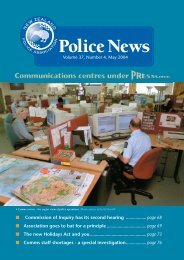Police News June 09.indd - New Zealand Police Association
Police News June 09.indd - New Zealand Police Association
Police News June 09.indd - New Zealand Police Association
You also want an ePaper? Increase the reach of your titles
YUMPU automatically turns print PDFs into web optimized ePapers that Google loves.
<strong>New</strong> <strong>Zealand</strong> <strong>Police</strong> <strong>Association</strong>Obituary:Victor James Monteith WhymanThe Auckland <strong>Police</strong> Pipe Band and thepipe band movement in <strong>New</strong> <strong>Zealand</strong> losta versatile and multi-talented member,with the recent death of Vic Whyman.Vic had been a playing member of theAuckland <strong>Police</strong> Pipe Band since themid-1980s and was the President of theband for the last few years.Vic joined the NZ Army as a RegularForce Cadet in 1950 and graduatedinto the Royal Electrical and MechanicalEngineers as an instrument technician,which meant that he was qualified asboth a watchmaker and as a fitter andturner; the latter skill of great benefit inlater years when he turned his hand tomaking parlour pipes, bag pipe chantersand drone reeds.Whilst a Regular Force Cadet andon joining the Army workshops atTrentham, Vic played for a pipe band inthe Hutt Valley. His Army career lasted30 years and he steadily rose in rankthroughout that period, including beingcommissioned and retiring from theArmy as a Major. His service postingsincluded Trentham, Burnham, Waiouru,Auckland, Singapore, Hong Kong andthe USA. It was after retiring from theArmy that Vic joined the Auckland<strong>Police</strong> Pipe Band where he continuedto play an active part until late last yearwhen illness intervened.Member for over 20 yearsAs an active member of the Auckland<strong>Police</strong> Pipe Band for over 20 years, Vicwas with it as it rose in stature in the NZPipe Band movement and participatedin a number of overseas trips includingHawaii, Alaska, Canada, the USA,Japan, China, Australia (twice) and theEdinburgh Tattoo in Scotland. The bandwill miss himgreatly. He wasa familiar faceto a number ofAuckland staff,having played at anumber of <strong>Police</strong> functions throughoutthe region.As a moving tribute to Vic, the Auckland<strong>Police</strong> Pipe Band visited him at the NorthShore Hospice just prior to his death. Heindicated to his immediate family, whowere there, how much he had enjoyedhearing the band play for him. He died acouple of hours later presumably with thesound of his much beloved and favouriteinstrument still ringing in his ears.His funeral was held on the 24th ofApril, attended by family, friends,Auckland <strong>Police</strong> Pipe Band membersand Waitemata <strong>Police</strong> management.“I want to be thoroughly used up when I die, for the harder I work, the more I live. I rejoice in life for itsown sake. Life is no candle to me. It is a sort of splendid torch, which I have got hold of for the moment,and I want to make it burn as brightly as possible before handing it to future generations.”- George Bernard Shaw.<strong>Police</strong> Health Plan stalwart Sue Pearce retiresBy Steve Plowman, Editor, <strong>Police</strong> <strong><strong>New</strong>s</strong>Last month, a large gathering of <strong>Police</strong> <strong>Association</strong> staff, some<strong>Police</strong> staff and former workmates of Sue Pearce gathered atthe National Office to mark her retirement after 22 years ofservice to the <strong>Association</strong> and its membership.Sue was supervisor of the <strong>Police</strong> Health Plan.Sue originally came to the <strong>Association</strong> at the behest of hersister Tania Winkels (then an <strong>Association</strong> Industrial Officer)to “fill in part-time for two weeks in the <strong>Police</strong> Health Plan”.Those two weeks turned in to 22 years.The <strong>Police</strong> Health Plan was in its infancy in October 1987 andSue has been instrumental, along with the support of somegreat staff, in ensuring it has become a leader in the field ofhealth insurance in the interim.MembershipAt that time, Sue was at varsity doing a BA in Social Policy. Therewere 8,000 PHP members. Nowadays there are four times asmany. Membership now increases by around 1,000 a year.The major change during those 22 years has beencomputerisation.Claims were all done manually in 1987. It was a very timeconsuming exercise. “There was no way to check whethermembers were in default or even, in fact, whether they werepaying their subs. All you had was a membership databaseand everything else was paper-based.” All the cheques forclaim payments were also done by hand.While computers changed all that and probably saved halfan Amazon rainforest to boot, the workload hasn’t stoppedgrowing. “I think in some instances the claims take longertoday, not only because we are dealing with more peoplebut because of the complexity of the claims. We now handlecomplex medical procedures and treatment from providerswe would not have covered previously,” she told <strong>Police</strong> <strong><strong>New</strong>s</strong>.Claims<strong>Police</strong> Health Plan now accepts claims for treatment byregistered osteopaths, chiropractors, acupuncturists anddentists. Staff have to check professionals’ accreditation,which adds another dimension to the modern workload andthere are always determinations to be made around elective ornon-elective operations too.After leaving school, Sue made use of her love of maths byworking in the Government Actuary’s Office before working atWellington Hospital for a couple of years, during which timeshe worked as part of the cardiology team. She then moved onto Wairau Hospital in Blenheim and became a theatre assistantat Lister Hospital.<strong>June</strong> 2009121

















